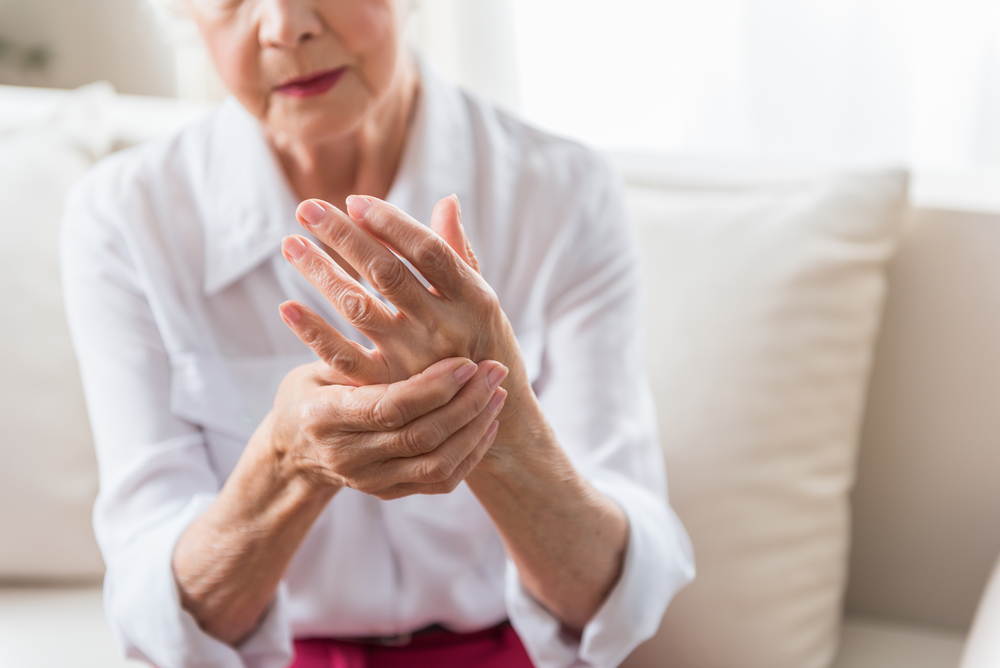Rheumatoid arthritis, or RA, is a systemic autoimmune disease that occurs when your immune system attacks healthy cells in your body by mistake, causing pain and inflammation. Unlike the wear and tear injuries of osteoarthritis, RA affects the lining of the joints, causing a painful swelling that eventually leads to bone erosion and joint deformity.
Rheumatoid arthritis is a chronic inflammatory disease that doesn’t just affect your joints. In severe cases, the condition can damage multiple body systems, including the skin, eyes, lungs, heart, and blood vessels. There is no cure for RA, so treatment focuses on treating the symptoms and reducing the condition’s progression.
Symptoms of Rheumatoid Arthritis
The symptoms of rheumatoid arthritis vary from person to person and may also include more general symptoms and inflammation in other parts of the body. The main symptoms are:
- Pain in more than one joint
- Swelling in more than one joint
- Stiffness in more than one joint
Other general symptoms include:
- Weight loss
- Fever
- Fatigue
- Weakness
- Dry eyes
The symptoms of rheumatoid arthritis often develop gradually over several weeks, but some cases can progress quickly over several days. Recognizing and diagnosing RA can be challenging as symptoms may come and go, or change over time so it is vital to seek a professional opinion when symptoms arise. Left untreated, severe RA can lead to worsening symptoms and physical disability.
What causes Rheumatoid Arthritis?
As stated, RA is a systemic autoimmune disease in which the body’s immune system attacks its own healthy tissues. The specific causes of RA are unknown, but some factors can increase the risk of developing the disease.
- Age. RA can begin at any age, but the likelihood increases with age and is highest among adults over 55 years old.
- Sex. Women are 2-3 times more likely to develop RA than men.
- Genetics. Some people are genetically predisposed to develop RA, although research has not confirmed a causal relationship. Some genes can also make arthritis symptoms worse.
- Smoking. Studies show that smoking increases the risk of developing RA and can worsen RA symptoms.
- Obesity. Studies have found that the more overweight a person is, the higher their risk of developing RA.
Treating Rheumatoid Arthritis
Clinical treatment of rheumatoid arthritis focuses on controlling the inflammatory process. Initially, treatment may include non-steroidal anti-inflammatory drugs (NSAIDs). Disease-modifying antirheumatic drugs (DMARDs) may be prescribed for individuals whose arthritis is persistent or unresponsive to traditional treatment methods. DMARDs are a group of medications that work to suppress the body’s overactive immune and/or inflammatory systems.
If symptoms persist, injections and infusion therapy are options that provide longer relief for RA symptoms. Injectable medications are medications that are administered into your body and naturally disperse the medication where needed. Oftentimes, your doctor may prescribe an injectable DMARD. Taking the drug this way puts more of it into your system without increasing side effects. Treatments such as these can be performed by a healthcare provider or the medication can be self-injected. Our telemedicine services can assist you in learning to administer the injections yourself and monitor your results until you are more comfortable with the process.
Infusion therapies include a plethora of medication options, but may be a better option for longer-lasting relief. Initially, infusions are completed weekly or bi-weekly. After a few treatments, doses can be taken monthly or even longer depending on the medication and your results.
Pacific Arthritis is a group of rheumatology experts in Los Angeles and Santa Monica who have undergone specialized training in the diagnosis and treatment of arthritis. Our experienced team is dedicated to providing immediate and long-lasting relief for your arthritis pain and symptoms.
If your loved one is experiencing arthritis symptoms, call (310) 297-9221 to schedule an appointment.




